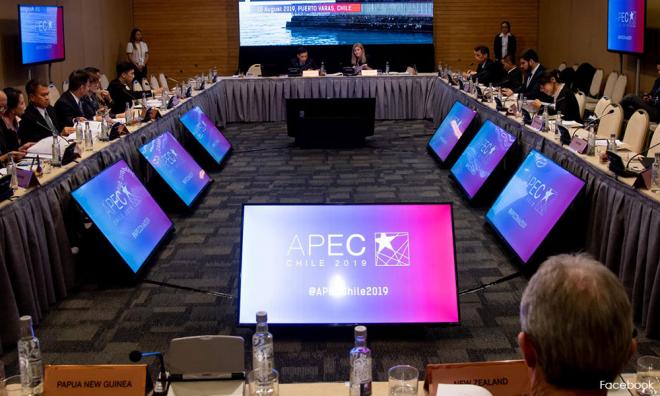
Published by Malay Mail & Malaysiakini, image from Malaysiakini.
Amidst the shocked announcement of Chile’s decision to withdraw from hosting the Asia-Pacific Economic Cooperation (Apec) Leaders’ Week in November, Malaysia looks set in its preparation as the host country for the Apec meet next year.
It was a shock announcement because it is the first time that a host country has ever decided to suspend an Apec summit, especially about two weeks before the event is to be held.
However, it is an understandable decision — the mayhem besetting the country has forced Chilean President, Sebastian Pinera, who is also fighting for his political survival, to take the “painful” decision in order to focus on restoring law and order and pushing through a new social plan.
“As president to all Chileans I must always put the problems and interests of Chileans, their needs, their desires and their hopes, first,” he said in a brief statement at the La Moneda presidential palace in Santiago.
True indeed, for unless he is able to take care of the security of his people and country, there is no guarantee that he can take care of the security of the leaders of the inter-governmental forum for 21 Pacific Rim countries that promotes free trade throughout the Asia-Pacific region, who would all be in Chile.
Chile announced on Wednesday that it would no longer host the Apec Summit after civil unrest over income inequality descended into violence as security forces were deployed to quell the demonstrations.
It was reported that riots, arson and protests over inequality in Chile last month have left at least 18 dead, 7,000 arrested and Chilean businesses hit with losses of around US$1.4 billion.
All eyes were earlier set on the Apec summit in Santiago, scheduled to take place on Nov 16-17, because of the anticipated talk about the historic trade deal between US and China taking place there.
US President Donald Trump and his China counterpart, Xi Jinping, are expected to sign this historic trade deal on the sidelines of the summit and the cancellation has now fuelled expectations that their two countries’ tariff war will now extend.
But the US seems very determined that the signing of this historic trade deal can still be done somewhere else. “As of now, it appears Apec will not occur in Chile, and it’s our understanding the organization does not currently have a secondary site prepared,” Hogan Gidley, White House principal deputy press secretary, said in a statement to reporters. “We’re awaiting potential information regarding another location.”
But of course, having the event at an Apec forum is better because the trade spat between the two countries had affected and are still affecting the lives of billions of people of the 21 member countries.
It is also good for the leaders of the 21 member countries of Apec to be witnessing this historic deal, as it will give a strong signal to the leaders of the two economic superpowers of the world that failure to ink the deal is not an option, as in their hands lie the ability to prevent a catastrophic global economic crisis.
Other than this, the cancelled Apec summit is also very important for its priorities, which include boosting the integration of financial markets through the digital economy, financial inclusion, financial management of disaster risks, regional connectivity, women’s role in economic growth and other financial cooperation matters that would be crucial for the Fourth Industrial Revolution (4IR).
For example, the 4IR has seen the rapid growth of the Internet of Things (IoT) with the concomitant new risks and vulnerabilities that come along with it, together with the leadership opportunities for the private sector on a global scale.
According to International Data Corporation (IDC), a global provider of market intelligence for IT, worldwide spending on IoT is forecast to reach US$745 billion in 2019, an increase of 15.4% over the $646 billion spent in 2018.
IDC also expects worldwide IoT spending will maintain a double-digit annual growth rate throughout the 2017-2022 forecast period and surpass the US$1 trillion mark in 2022, with an estimated 20 billion connected devices in operation by 2020.
As IoT creates new, innovative opportunities for businesses worldwide, it also introduces new types of cybersecurity risks that will begin to evolve and grow. To continue the secure, innovative growth of the global IoT sector, the business community must find a sustainable solution that takes into account all connected IoT devices, the applications they run, and the networks they use to transmit information.
In this regard, important guidance on IoT security has also been created by Apec, which has positioned itself to be a global leader on the development of IoT frameworks, standards and norms.
Historically, Apec has a strong track record for creating standards within the digital economy, including developing the Framework for Securing the Digital Economy and the Apec Internet and Digital Economy Roadmap.
Meanwhile the Apec Committee on Trade and Investment (CTI) has started a multi-year initiative to address cybersecurity standards in the Apec region, with the first Apec cybersecurity standards workshop held in Puerto Varas, Chile during the 3rd Senior Officials’ Meeting in August.
It is hoped that a follow-through on this would take place in the Apec Summit in Santiago, but what a pity it had to be cancelled.
But all is not lost when Apec Malaysia 2020 is expected to continue driving momentum on cybersecurity issues focused exclusively on IoT standards, which provides an excellent opportunity to get governments, industry and academia to collaboratively address IoT challenges and solutions in one of the most dynamic, high-growth regions in the world.
It is still not clear whether Apec 2019 will still be held, albeit in another country. On the one hand, time is of the essence as 2019 comes to a close but on the other hand, so much is at stake that it will be such a waste for all these priorities to remain in abeyance while waiting for Malaysia to hold Apec 2020 late next year.
As an afterthought, wouldn’t it be a good for Malaysia to rescue the situation by replacing Chile as the host for Apec 2019.
Malaysia’s track record in holding an international conference is excellent. After all, Malaysia had organised Apec1998 before. Moreover, the priorities delineated for Apec 2019 are all, to some extent, found in Budget 2020.
Perhaps as a reward for rescuing the situation, Malaysia should also be allowed to organise Apec 2020 as scheduled.
Then, being host for Apec 2019 would be sort of a curtain raiser — a profitable one to boot — for the Visit Malaysia Year 2020 (VMY2020) while being host for Apec 2020 is sort of like a natural ending for the VMY2020.
And to top it all, is Malaysia having the rare distinction of organising three Apec summits — the first one in 1998.
Of course, running against time to hold such an important event at such a short notice is a valid reason for not hosting it.
But maybe the Apec Secretariat can be flexible enough about it by postponing the Apec 2019 to early December in view of the solid track record that Malaysia has in organising important international event.
What do you think?
Jamari Mohtar is Director of Media & Communications at EMIR Research, an independent think-tank focused on strategic policy recommendations based upon rigorous research.

